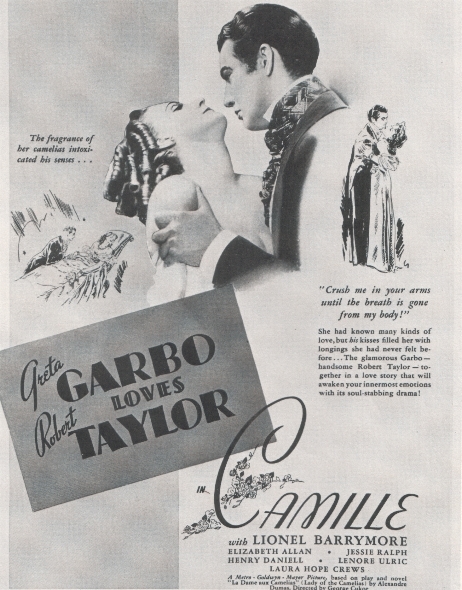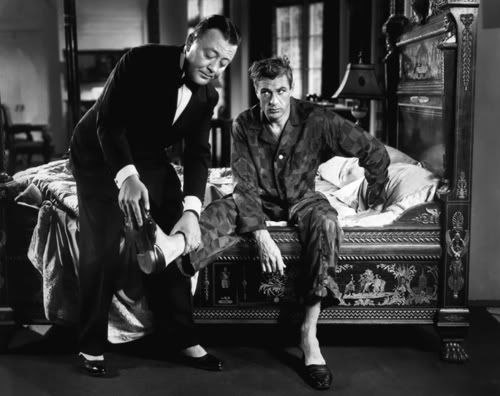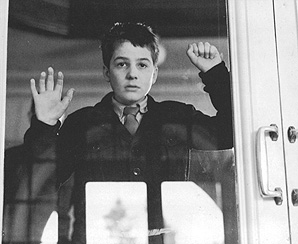1. Pulp Fiction (1994)
2. The Lord of the Rings trilogy (2001-03) don't know if I could ever re-watch this
3. Titanic (1997)
4. Blue Velvet (1986)
5. Toy Story (1995)
6. Saving Private Ryan (1998 )
7. Hannah and Her Sisters (1986)
8. The Silence of the Lambs (1991)
9. Die Hard (1988 )
10. Moulin Rouge (2001)
11. This Is Spinal Tap (1984)
12. The Matrix (1999)
13. GoodFellas (1990)
14. Crumb (1995)
15. Edward Scissorhands (1990)
16. Boogie Nights (1997)
17. Jerry Maguire (1996)
18. Do the Right Thing (1989)
19. Casino Royale (2006)
20. The Lion King (1994) i may have seen this, nonetheless it needs to be watched again
21. Schindler’s List (1993)
22. Rushmore (1998 )
23. Memento (2001)
24. A Room With a View (1986)
25. Shrek (2001)
26. Hoop Dreams (1994)
27. Aliens (1986) i've seen a snippet-a very graphic snippet of an alien coming out of a guy's guts...no more thank you...
28. Wings of Desire (1988 )
29. The Bourne Supremacy (2004)
30. When Harry Met Sally… (1989)
31. Brokeback Mountain (2005)
32. Fight Club (1999)
33. The Breakfast Club (1985)
34. Fargo (1996)
35. The Incredibles (2004)
36. Spider-Man 2 (2004)
37. Pretty Woman (1990)
38. Eternal Sunshine of the Spotless Mind (2004) would like to see this again
39. The Sixth Sense (1999)
40. Speed (1994)
41. Dazed and Confused (1993)
42. Clueless (1995)
43. Gladiator (2000)
44. The Player (1992)
45. Rain Man (1988 )
46. Children of Men (2006) excellent film. well deserved on this list.
47. Men in Black (1997)
48. Scarface (1983)
49. Crouching Tiger, Hidden Dragon (2000)
50. The Piano (1993)
51. There Will Be Blood (2007)
52. The Naked Gun: From the Files of Police Squad (1988 )
53. The Truman Show (1998 )
54. Fatal Attraction (1987)
55. Risky Business (1983)
56. The Lives of Others (2006)
57. There’s Something About Mary (1998)
58. Ghostbusters (1984)
59. L.A. Confidential (1997)
60. Scream (1996) it has been positively ages...don't want to watch it again nonetheless
61. Beverly Hills Cop (1984)
62. sex, lies and videotape (1989)
63. Big (1988)
64. No Country For Old Men (2007)
65. Dirty Dancing (1987)
66. Natural Born Killers (1994)
67. Donnie Brasco (1997)
68. Witness (1985)
69. All About My Mother (1999)
70. Broadcast News (1987)
71. Unforgiven (1992)
72. Thelma & Louise (1991)
73. Office Space (1999)
74. Drugstore Cowboy (1989)
75. Out of Africa (1985)
76. The Departed (2006)
77. Sid and Nancy (1986)
78. Terminator 2: Judgment Day (1991)
79. Waiting for Guffman (1996)
80. Michael Clayton (2007)
81. Moonstruck (1987)
82. Lost in Translation (2003)
83. Evil Dead 2: Dead by Dawn (1987)
84. Sideways (2004)
85. The 40 Year-Old Virgin (2005)
86. Y Tu Mamá También (2002)
87. Swingers (1996)
88. Austin Powers: International Man of Mystery (1997)
89. Breaking the Waves (1996)
90. Napoleon Dynamite (2004) could not sit through all of this--twice--
91. Back to the Future (1985)
92. Menace II Society (1993)
93. Ed Wood (1994) one of the best things Tim Burton and Johnny Depp ever did together
94. Full Metal Jacket (1987)
95. In the Mood for Love (2001)
96. Far From Heaven (2002)
97. Glory (1989)
98. The Talented Mr. Ripley (1999)
99. The Blair Witch Project (1999) the hype was scarier than the actual thing--although, the very end where the three young filmmakers run away and drop their cameras, and what you see is this camera on the ground while it looks like one of those filmmakers is standing in the distance, that was spooky.
100. South Park: Bigger Longer & Uncut (1999)













